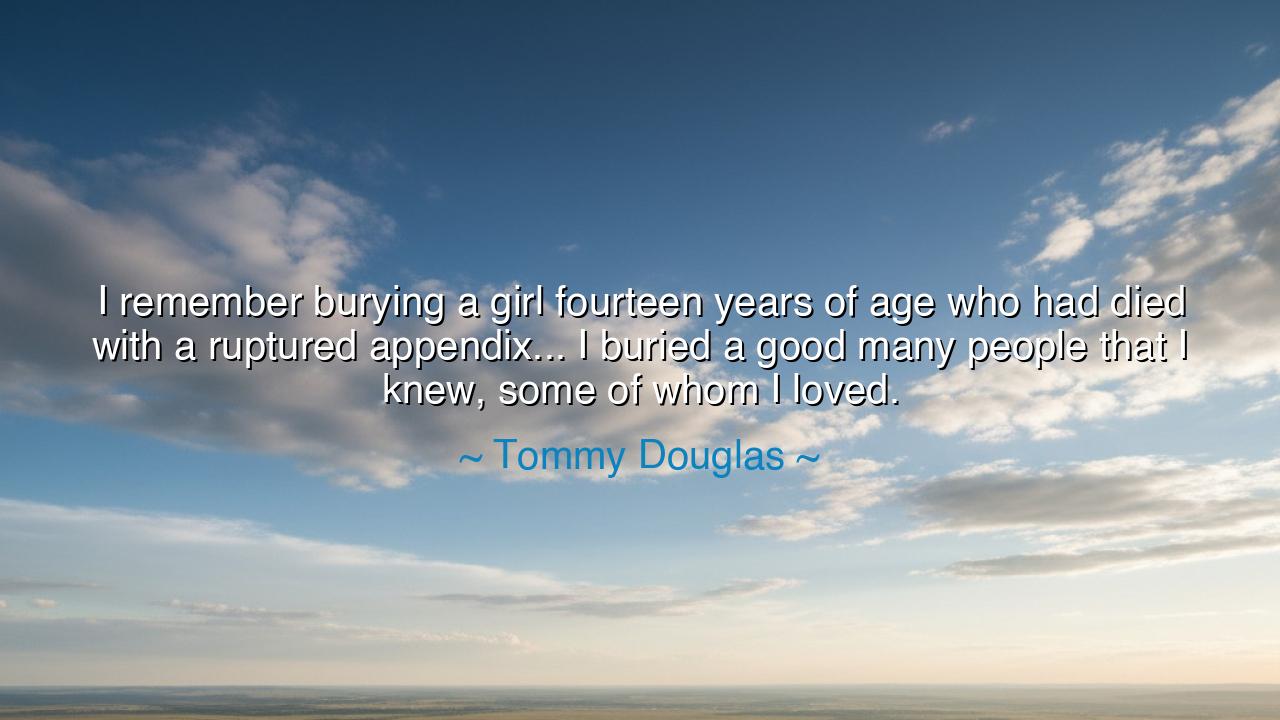
I remember burying a girl fourteen years of age who had died with
I remember burying a girl fourteen years of age who had died with a ruptured appendix... I buried a good many people that I knew, some of whom I loved.






“I remember burying a girl fourteen years of age who had died with a ruptured appendix... I buried a good many people that I knew, some of whom I loved.” — Tommy Douglas
Thus spoke Tommy Douglas, the father of universal healthcare in Canada — a man whose compassion was carved by sorrow, and whose greatness was born from grief. In these haunting words, he recalls not a tale of triumph, but of tragedy: the loss of a young girl, no older than a budding spring, who died not from fate, but from poverty. For had she been born into wealth, her life might have been saved by the surgeon’s hand. But she, like so many others, perished in a world where healing was a privilege, not a right. Through these words, Douglas does not simply remember the dead — he calls upon the living to awaken their conscience.
He spoke these words as a man who had seen the cruelty of inequality with his own eyes. Before he was a leader, Douglas was a young Baptist minister in the town of Weyburn, Saskatchewan. He tended to his congregation through the Great Depression — a time when hunger stalked families, and sickness was a death sentence for the poor. He watched as good men and women — farmers, mothers, children — died from illnesses that could have been cured, if only they could afford the price of care. The girl with the ruptured appendix was not the first to die, nor the last, but she became the emblem of all who suffered unjustly in a world governed by wealth instead of mercy.
In his heart, this memory burned like fire. The burial of the innocent became a sacred wound — one that would never heal, but instead transform into resolve. From the graves of the forgotten, Douglas drew a single, immortal truth: that health should not be bought, and that the right to live must not depend on the weight of one’s purse. Out of this grief rose his vision for universal healthcare, a system where no one would die for lack of means, where every life, rich or poor, would be treated with equal worth. Thus, from death, he created the seed of salvation for millions.
The ancients, too, knew this paradox: that suffering, when met with courage, can give birth to justice. Consider Florence Nightingale, who walked among the dying soldiers of the Crimean War and turned her anguish into a revolution in medicine. Like Douglas, she saw the cruelty of neglect and answered it not with despair, but with action born of love. Her light, flickering through the corridors of war-torn hospitals, became a symbol of compassion that changed the very soul of medicine. So too did Douglas bear his torch into the darkness — not of battlefields, but of bureaucracy and indifference — and lit the path to mercy through policy.
There is a sacred power in such remembrance. When Tommy Douglas said, “I buried a good many people that I knew, some of whom I loved,” he was not indulging in sorrow, but preserving their memory as fuel for righteousness. He reminds us that grief can either shatter the heart or sharpen it. In his case, it forged a moral vision stronger than any steel — that no nation can call itself civilized while its poor die for lack of care. His words, though spoken decades ago, echo still in every debate about justice and dignity, for they speak not only of medicine, but of humanity itself.
The lesson, then, is both simple and profound: let compassion guide your strength. Do not turn away from suffering; let it teach you what must be changed. For in every grave dug by neglect, in every tear shed by the helpless, lies a summons to conscience. The wise do not ask, “Why does suffering exist?” but “What shall I do because it does?” Like Douglas, let your pain become your purpose, and your empathy your armor.
Practical counsel for the seeker:
-
When you witness injustice, do not look away; let it move you to act.
-
Honor the memory of those lost to indifference by fighting for the living.
-
Remember that compassion is not weakness, but the highest form of courage.
-
And know that the smallest act done in love — a vote, a word, a helping hand — can ripple through generations, transforming sorrow into salvation.
For as Tommy Douglas teaches, the greatest revolutions are not born from ambition, but from heartbreak. The girl with the ruptured appendix was one life among millions, but through her death, the world was changed. When grief becomes grace, when remembrance becomes resolve, then we, too, become healers — not only of bodies, but of nations and of souls.






AAdministratorAdministrator
Welcome, honored guests. Please leave a comment, we will respond soon